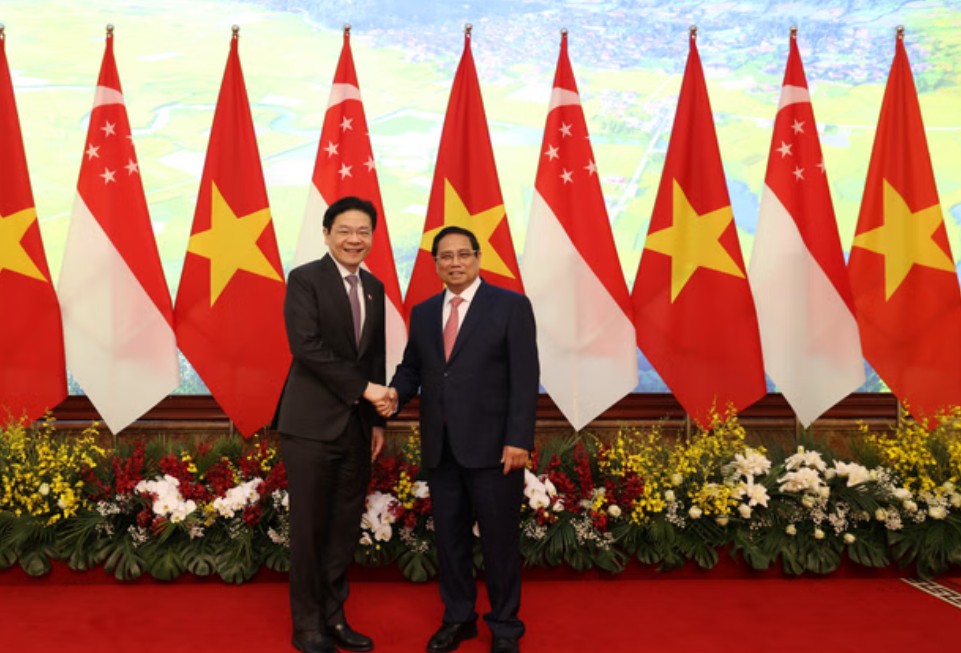HANOI – The bilateral relationship between Singapore and Vietnam has reached new heights, with both nations deepening economic and strategic cooperation, Singaporean Prime Minister Lawrence Wong said at the start of his official visit to Hanoi on March 25, 2025.
“I am confident that our ties will continue to grow from strength to strength,” PM Wong stated in a toast speech at a dinner hosted by Vietnamese Prime Minister Pham Minh Chinh at the Office of Government. He emphasized the regular high-level exchanges between the two nations, citing their history of deepening trust and cooperation since the first official visit between then-Senior Minister Lee Kuan Yew and then-General Secretary Do Muoi decades ago.
Vietnamese leaders echoed this sentiment, with PM Chinh acknowledging that Singapore has been a reliable partner in Vietnam’s economic transformation, particularly in areas such as infrastructure development, trade, and digital innovation. He reaffirmed Vietnam’s commitment to further strengthening economic ties and strategic cooperation under the Comprehensive Strategic Partnership (CSP), which was formalized earlier in March 2025 during Communist Party of Vietnam General Secretary To Lam’s visit to Singapore.
Economic Synergy Despite Different Political Systems
The growing partnership between Singapore and Vietnam stands out given their starkly different political systems. While Singapore operates as a technocratic democracy, Vietnam remains a one-party socialist state. However, both nations have found common ground in economic pragmatism, with Vietnam looking to Singapore as a model for efficient governance and business-friendly policies.
During the visit, PM Wong and PM Chinh witnessed the signing of several agreements, reinforcing cooperation in key areas, including:
- Digital Economy and Cybersecurity: Strengthening fintech, AI-driven solutions, and cybercrime prevention.
- Renewable Energy and Carbon Credits: Enhancing cross-border electricity trade, low-carbon power, and sustainability projects.
- Strategic Infrastructure Development: Advancing smart cities, green financing, and subsea cable connectivity.
PM Wong also praised Vietnam’s commitment to human capital development, highlighting that over 22,000 Vietnamese officials have attended courses under the Singapore Cooperation Programme. “Singapore is honored to play a role in supporting Vietnam’s workforce transformation, which aligns with PM Chinh’s three ‘strategic breakthroughs’ in institutional reform, digital infrastructure, and human resource development,” he said.
In response, PM Chinh encouraged more Singaporean companies to expand their presence in Vietnam, particularly in low-carbon power and digital industries, pledging government support for these projects.
A Stabilizing Force for ASEAN Amid Political Uncertainty
The strengthening ties between Singapore and Vietnam come at a crucial time for ASEAN, which has faced growing political instability due to internal challenges. Countries like Myanmar, Cambodia, the Philippines, and Indonesia have been at the center of political crises, governance concerns, and geopolitical tensions, putting pressure on ASEAN’s unity and credibility.
Both Singapore and Vietnam have been among the most proactive members of ASEAN, advocating for regional stability, economic integration, and rules-based governance. Their growing cooperation sets an example for ASEAN’s future direction, reinforcing:
- Economic Resilience: Strengthening supply chain security and fostering regional trade partnerships.
- Geopolitical Stability: Enhancing maritime security cooperation in the South China Sea, where both nations have aligned interests.
- ASEAN Centrality: Demonstrating a commitment to regional integration and multilateralism, despite political differences.
While Singapore and Vietnam continue to navigate their distinct political ideologies, their pragmatic cooperation showcases ASEAN’s potential to thrive despite internal pressures.
Looking Ahead: Realistic Prospects for Singapore-Vietnam Relations
While both nations remain optimistic, challenges remain in translating their growing partnership into concrete and lasting benefits. Differences in regulatory environments, governance models, and economic priorities will require continued diplomatic engagement and mutual compromise.
However, the Comprehensive Strategic Partnership provides a clear roadmap for future collaboration, with both nations prioritizing technology, sustainability, and trade expansion. As PM Wong’s visit reinforces a long-term commitment, Singapore and Vietnam are poised to lead ASEAN’s economic transformation amid global uncertainties.
For now, this high-level engagement signals a strong and resilient bilateral relationship—one that could serve as a blueprint for ASEAN’s future stability and growth. (zai)

